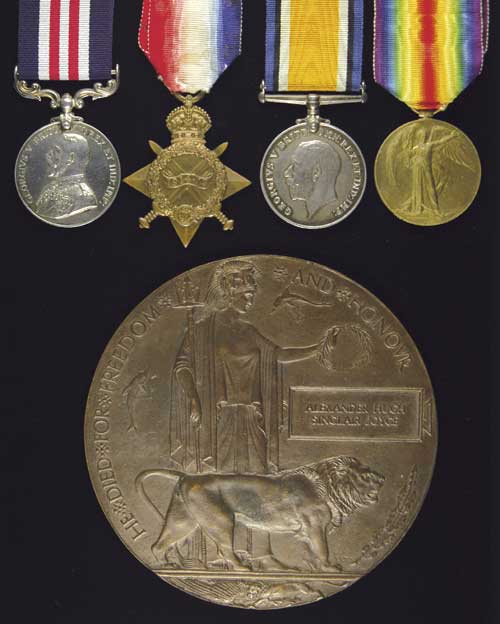
Auction: 7012 - Orders, Decorations, Medals & Militaria
Lot: 593
The Great War 1916 ´Carnoy Raid´ M.M. Group of Four to Second Lieutenant A.H.S. Joyce, Norfolk Regiment, Late Lance Corporal, Bedfordshire Regiment, Who Died of Wounds, August 1918 a) Military Medal, G.V.R. (22101 Cpl. A.H.S. Joyce. 7/Bedf:R.) b) 1914-15 Star (22101 L. Cpl. A.H.S. Joyce. Bedf:R.) c) British War and Victory Medals (2.Lieut. A.H.S. Joyce.), nearly extremely fine, with Great War Bronze Memorial Plaque ´Alexander Hugh Sinclair Joyce´ (5) Estimate £ 1,200-1,400 M.M. London Gazette 3.6.1916 22101 Cpl. A.H.S. Joyce, 7th Bn., Bedf. R. Second Lieutenant Alexander Hugh Sinclair Joyce, M.M., born Putney, London, 1890; enlisted Grenadier Guards, 4.11.1914; transferred 7th Battalion Bedfordshire Regiment, 10.6.1915; Lance Corporal 21.6.1915; Corporal 22.3.1916; served during the Great War with the Regiment in the French theatre of war from, 27.7.1915 and took part in a raid on the enemy trenches near Carnoy, 27.4.1916, ´Of course I remember Corporal Joyce. He was one of the N.C.O´s of D Company that took part in the Carnoy Raid for which he received the Military Medal. I also remember that he was not among the N.C.O´s I originally picked for the job but his Platoon Sergeant told me that he was so anxious to go that I consented to let him join the others. He did excellent work on that night and after he was wounded I found it very difficult to replace him as he was so good with the men, never ´got the wind up.´ You know the value of this kind of man.´ (Recommendation Letter for Joyce´s commission, from Captain T.E. Lloyd, O.C. D Company, 7th Battalion for the Carnoy Raid, refers) An account by Captain H. Driver (who led the raid and was awarded the D.S.O. for the action) in the Bedford´s Regimental History offers more incite into the action that Joyce suffered two gunshot wounds from, ´We managed quite easily to get volunteers for the raid, and I proceeded to train them at Bray. It must be understood that these were the early days of raids, and none of us expected to get back from the Bosche line even if we succeeded in reaching it.......... the Bedfordshire Regiment took over the line again, and the raid was to take place the same night at 2.30am. The raiding party and myself by this time felt we were all to soon face something we would have gladly handed over to others, and we tried to appreciate the grim jest that if we were successful we should immediately go on leave. During the evening the raiding party foregathered in a dug-out near the point in our trench from which we proposed to start. We all blackened our faces and hands so as not to show up in the dark, and prepared our bombs..... We settled down about 10.30pm for a four-hour wait, having completed our preparations.... At 2.15am precisely thirty-four black-faced ruffians, each heavily laden, climbed over the top, and lay down in No Man´s Land in accordance with our plan. Suddenly at 2.30 we saw a vivid flash behind us, followed by a terrible crash. It was the opening of our barrage...... I kept looking at my luminous watch, knowing that at 2.40 the barrage would lift, and we must then be ready to jump into the Bosche trench. Fortunately, I found the exact point at which we were to enter it....... Everything now went like clockwork. One party descended the ladder and went to the left. A second party went to the right, while a third remained on guard at the point of entry. We also knew that by this time a fourth party was out in No Man´s Land laying a white trail (with chloride of lime) to guide us back over the two or three hundred yards of pitch-black space we had crossed. The few stray Bosches found wandering about the trench were summarily disposed of, but the chief difficulty lay in dealing with those who had sought refuge in their deep dug-outs, which at this part of the line were found about every 10 yards....... each being lit up or containing about a dozen or more Huns......... There was no time to haul them out and take them back as prisoners, and we had brought 368 bombs..... It was fairly simple to roll these bombs down the stairs, and deal with the dug-outs systematically in this way.´ The three parties eventually reconvened at the appointed place and despite carrying wounded, managed to return to British lines just before dawn, ´Sergeant Mills got a D.C.M., Corporals Lancaster and Joyce got Military Medals, and every man got a ´Parchment´ from General Maxse, Commander of the Division.´ (Captain H. Driver´s account refers). The raid was reported as a success in Sir Douglas Haig´s daily communique. After recovering from his wounds Joyce applied for a commission, which he succeeded in achieving when he was posted as Second Lieutenant 12th Battalion, Norfolk Regiment, December 1917; it was whilst serving with the latter that he died of wounds, 20.8.1918, and is buried in Longuenesse (St. Omer) Souvenir Cemetery.
Sold for
£1,400




